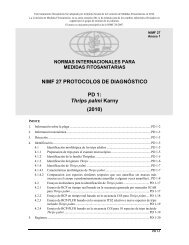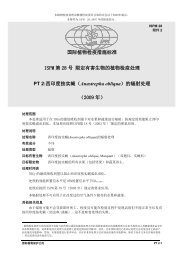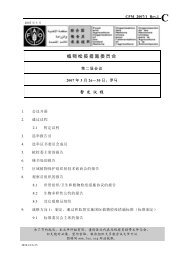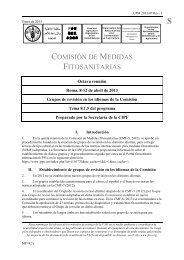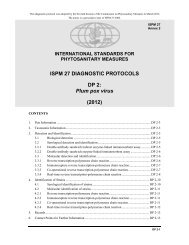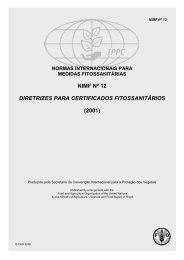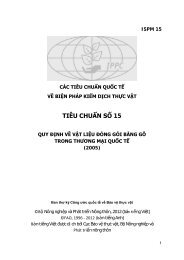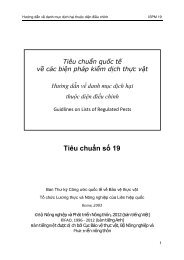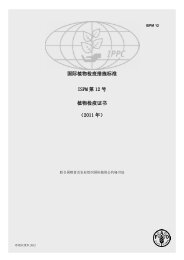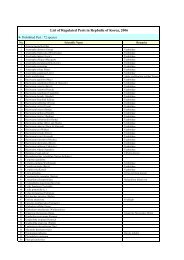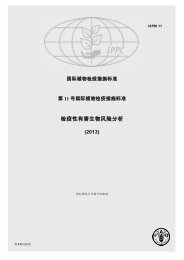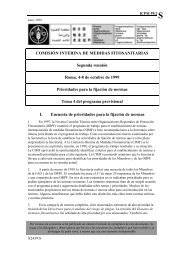Untitled
Untitled
Untitled
Create successful ePaper yourself
Turn your PDF publications into a flip-book with our unique Google optimized e-Paper software.
Mr. David C. Nowell from the IPPC secretariat welcomed participants and announced<br />
that this workshop was part of a series of worldwide IPP workshops. It was noted that<br />
participants would be provided with background on the IPP, a detailed discussion on<br />
national reporting delegations under the IPPC, and an explanation of navigation and data<br />
entry. Participants were encouraged to participate fully as the outcome of this pilot<br />
workshop would largely determine the content and structure of future IPP workshops. As<br />
needs of different countries would vary, he encouraged free discussion and also hoped to<br />
improve the actual IPP website, through feedback from participants, during the entire<br />
process. Mr. Nowell thanked Malaysia for their excellent organization of the workshop and<br />
the hard work of the organizing committee.<br />
2.3 Opening of Workshop<br />
The workshop was opened by Y. Bhg. Dato’ Sofian Mohd. Salleh, Deputy Director<br />
General of Agriculture, Malaysia. In his inaugural speech, he thanked the organizing<br />
committee for the invitation to officiate this workshop, and on behalf of the Government of<br />
Malaysia, he extended his warmest welcome to the distinguished speakers, guests and<br />
participants. He noted that Malaysia was given the honour to conduct the Pilot Workshop<br />
earlier from 17 to 20 January 2005, which was the first ever organized by the FAO for<br />
information exchange – IPP. The success of that Pilot Workshop had spawned<br />
recommendations used for the improvement of future regional workshop all over the world,<br />
notably the one conducted in Central Europe in March 2005.<br />
Dato’ Sofian then mentioned that it was a great honour to host this important training<br />
workshop, which is one of a series of regional and sub-regional workshops arranged by the<br />
IPPC Secretariat, with the main purpose to clarify national phytosanitary information<br />
exchange obligations and to provide basic training to official contact points. In this era of<br />
information technology, it must be recognized that the role of information exchange and the<br />
mode of information movement are of paramount importance for decision making and<br />
capacity building in the various areas of concern. In addition, electronic information<br />
exchange also provides for transparency, clarity and timeliness on the availability of the<br />
information.<br />
He lauded the initiative of IPPC/FAO to establish the portal. The establishment and<br />
availability of the IPP facility will facilitate, enhance and strengthen the capacity of<br />
contracting parties to communicate efficiently, effectively and timely with the IPPC<br />
Secretariat, and more importantly between and among IPPC members, especially between<br />
trade partners. The IPP should be linked, where relevant, with other existing official<br />
international information exchange system such as the clearinghouse mechanism for the<br />
Cartagena Protocol on Biosafety and the WTO. Under the WTO/Sanitary and Phytosanitary<br />
Agreement, it is now incumbent on WTO member countries to have the capacity to produce<br />
plant health information and import risk analysis that are science–based, objective and<br />
transparent to support the imposition of SPS measures. While notifications on SPS by a<br />
trading nation need to be relayed to the WTO, under this proposed linkage, the notification<br />
would also be sent to other member countries and the IPPC Secretariat through the IPP.<br />
Hence, to facilitate the dual function of the NPPO, it is imperative that developing countries<br />
in this region including Malaysia need to proactively prepare herself in strengthening the<br />
information area to be ready and capable of fulfilling the obligations under the IPPC as well<br />
as the demands of SPS/WTO requirements.<br />
It was of his opinion that this training workshop is most appropriate and timely,<br />
whereby more information will be required and made available due the immense increase in<br />
5




